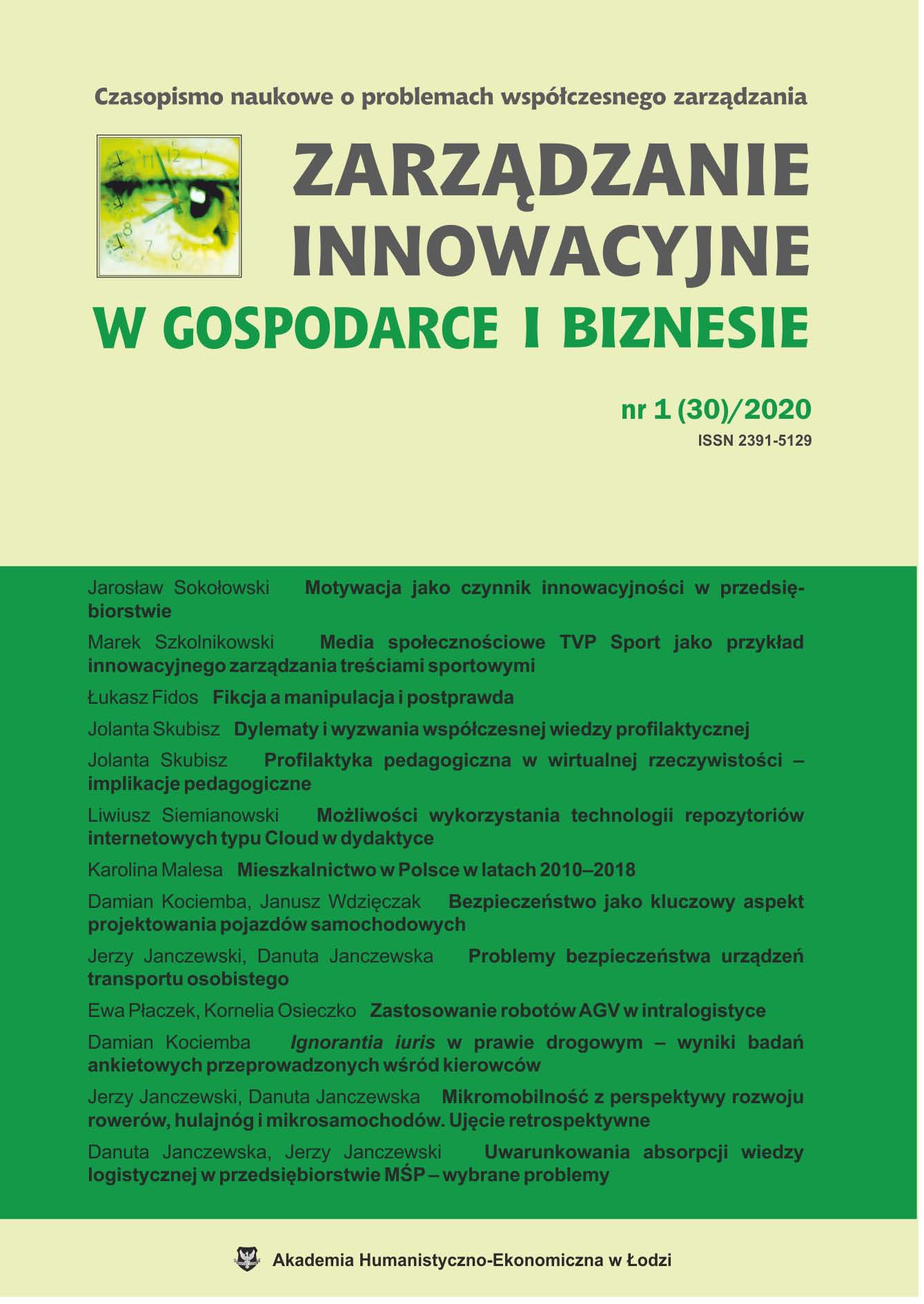Fiction and manipulation and post-truth
DOI:
https://doi.org/10.25312/2391-5129.30/2020_03lfKeywords:
fiction, manipulation, pretending, imitation, postruthAbstract
The author attempts to develop an understanding of the concept of post-truth ‒ which relates to a situation or signifying a situation in which objective facts have less influence on shaping public opinion than emotions and personal beliefs. In the article, this concept is primarily presented in the light of the concept of fiction analysis, which is considered to be the main feature of literature (belles-lettres), but is also an element of other forms of expression, such as, for example, legal regulations – as legal fiction. Post-truth pretends to play the role of the historical truth of contemporary times, such as factual material in a academic work, so an important observation is the remark about the blurry cognitive boundaries between literary fiction based on historical data and academic history. The observed demand of recipients of fiction to identify its content with reality, for the emotional need to identify ideas with facts is significant. Fiction as a specific linguistic creation contains many elements that enable flexible use of its content for various purposes: pretending, imitation, action announcements that have no effect. That is why fiction – pretending to be reality – introduces the lie “that pretends to exist” in culture. The possibilities of using fiction, manipulation or even lies for specific practical purposes were discussed in ancient Greece, so post-truth does not use own specific tools. Therefore, the author sees the differences between post-truth and the manipulations of past times in the social and cultural conditions of the functioning of these concepts, concluding that in past times authorities have used lies to manipulate subordinates, while posttruth is a reaction of subordinates to the lies and manipulations of the authorities.
Downloads
References
Antas J. (2008), O kłamstwie i kłamaniu, Universitas, Kraków.
Austin J.L. (1993), Mówienie i poznawanie. Rozprawy i wykłady filozoficzne, Wydawnictwo Naukowe PWN, Warszawa.
Carnap R. (1969), Filozofia jako analiza języka nauki, PWN, Warszawa.
Chudy W. (2003), Filozofia kłamstwa. Kłamstwo jako fenomen zła w świecie osób i społeczeństw, Oficyna Wydawnicza Volumen, Warszawa.
d’Ancona M. (2018), Postprawda, Wydawnictwo Krytyki Politycznej, Warszawa.
DePaolo B.M. i in. (1996), Lying in Everyday Life, “Journal of Personality and Social Psychology”, No. 70.
Dubiel N. (2018), Należyta staranność, dobra wiara w postępowaniu kontrolnym przed Urzędem Skarbowym a prawo do odliczenia nadwyżki podatku naliczonego, „Studia Ekonomiczne. Zeszyty Naukowe Uniwersytetu Ekonomicznego w Katowicach”, nr 377.
Duda S. (2018), Postprawda. Emocje górą, fakty do lamusa?, https://pl.aleteia.org/2018/01/07/postprawda-emocje-gora-fakty-do-lamusa/ [dostęp: 7.01.2018].
Fidos Ł. (2013), Przeciw nieuchronności kłamstwa, „Annales Universitatis Mariae Curie-Sklodowska”, vol. XXXVIII, 1, Sectio 1.
Fidos Ł. (2019), Poprawność polityczna i postprawda – przeciwieństwo czy konsekwencja. A gdzie miejsce prawdy?, „Zawsze Wierni”, cz. I: nr 4(203), s. 166–175, cz. II: nr 5(204), s. 175–180.
Hohol M. (2009), Zjawisko kłamstwa w perspektywie nauk neurokognitywnych i ewolucyjnych, „Semina Scientiarum”, nr 8.
Ingarden R. (1957), Studia z estetyki. T. 1, PWN, Warszawa.
Jakobson R. (1989), W poszukiwaniu istoty języka, Państwowy Instytut Wydawniczy, Warszawa.
Kepner J.I. (1991), Ciało w procesie Gestalt, Wydawnictwo Pusty Obłok, Warszawa.
Keyes R. (2018), Czas postprawdy. Nieszczerość i oszustwa w codziennym życiu, PWN, Warszawa.
Kołakowski L. (1966), O prawdzie i prawdomówności, „Studia Filozoficzne”, nr 2.
Kołakowski L. (2009), O kłamstwie, [w:] Mini wykłady o maxi sprawach, Wydawnictwo Znak, Kraków.
Lyons J. (1984), Semantyka, t. 1, PWN, Warszawa.
Machiavelli N. (b.r.), Książę, Koło Naukowe Historii Doktryn Uniwersytetu Jagiellońskiego, http://www.knhd.law.uj.edu.pl/pliki/teksty [dostęp: 20.05.2015].
MacIntyre A. (2009), Etyka i polityka, Wydawnictwo Naukowe PWN, Warszawa.
Markiewicz H. (1976), Główne problemy wiedzy o literaturze, Wydawnictwo Literackie, Kraków.
Ossowska M. (2000), Normy moralne. Próba systematyzacji, Wydawnictwo Naukowe PWN, Warszawa.
Pelc J. (1990), O pojęciu kłamstwa – z punktu widzenia semiotyki, „Studia Semiotyczne”, t. XVI–XVII.
Platon (2003), Państwo, Wydawnictwo Antyk, Kęty.
Reichenbach H. (1967), Elementy logiki formalnej, [w:] H. Reichenbach, Logika i język. Studia z semiotyki logicznej, PWN, Warszawa.
Russell B. (1906), Recenzja z: MacColl Symbolic logic and its applications, „Mind”, XV, za: T. Ciecierski (2011), Zależność kontekstowa. Wprowadzenie do problematyki, Ośrodek Badań Filozoficznych, Warszawa.
Searle J. (1967), Imiona własne, [w:] H. Reichenbach, Logika i język. Studia z semiotyki logicznej, PWN, Warszawa.
Szymczak M. (red.), Słownik języka polskiego, t. I–III, PWN, Warszawa.
Ślipko T. SJ (2005), Zarys etyki szczegółowej. Tom I: Etyka osobowa, Wydawnictwo WAM, Kraków.
Tesich S. (1992), A Government of Lies, “The Nation”, January 6–13.
Downloads
Published
Issue
Section
License
Copyright (c) 2020 Akademia Humanistyczno-Ekonomiczna w Łodzi

This work is licensed under a Creative Commons Attribution-ShareAlike 4.0 International License.



